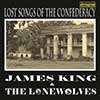Original copies of Lonewolves releases are very hard to find, even in Glasgow, so there has been a great deal of anticipation around "Lost Songs of the Confederacy". Legend has it that the album was originally recorded in the mid-‘80s with John Cale on production duties, at the height of his alcoholic madness. A match made in Heaven perhaps, if your concept of Heaven is a spit ‘n’ sawdust bar with Buckfast tonic wine on the optics. The album was never released, as the Lonewolves’ modus operandi of assiduously burning every bridge before they crossed it proved commercially counter-productive.
In 2011, James King- better known to his friends as Jimmy- buried the hatchet with guitarist Jake Mason after a 25-year estrangement. With Joe Sullivan also shouldering guitar duties, Nick Clark on bass and the youthful Corey Little on the traps, "Lost Songs of the Confederacy" has now been re-recorded with some pivotal new tracks added and has been released by the buccaneering new Edinburgh-based label, Stereogram Recordings.
The album pitches straight in with one of the band's best loved songs, "Fun Patrol". Guitars shimmer and twang as Corey Little lays down a pounding New York street strut, Nick Clark’s bass explodes from the speakers and King hollers like Johnny Thunders in full Punk Dion pomp, serving up every goading couplet with maximum relish. “Fall apart with me”, King urges, echoing Iggy Pop’s edict from "1970", "have a real fun time with me". The fire and brimstone evangelist in the denouement of the Roger Corman sci-fi flick "The Man With the X-Ray Eyes" is brought to mind as King demands that his acolytes "rip out your eyes for me"; like Iggy in his Stooges prime, preacher man Jimmy is touting a purposeful, gleeful death trip- redemption through self-immolation.
"Fun Patrol" is a hard song to follow, but what happens next is unexpected; like Hitchcock's ‘Psycho’, the album takes a dramatic left turn after that emphatic overture, shifting from hard-bitten street talk to open-hearted romanticism. It quickly becomes apparent that the Lonewolves are less an unholy conflation of The Stooges and The Heartbreakers, and more Hank Williams backed by Television at CBGB's.
Perhaps the fact that Jimmy’s nomme de guerre is Hank’s middle name is mere serendipity, but the comparison is acute on "Over the Side", "Fly Away" and especially the irresistible "While I Can", which swing and swagger with the hook-laden classicism of Hank stormers like ‘Move It On Over’. Also revealing a Byrds’ influence, lead single ‘Fly Away’ even features a perfectly-judged, jaunty sax break- if only more bands today would show such knowledge and respect for the ingredients that made rock ‘n’ roll great in the first place.
King’s sharp tongue and mythologised misdemeanours posit him as a combative figure, yet the lyrical depths of these songs elucidate the image as mere surface ripples of deeper currents. While "Bridgeton Summer" initially appears to lament a lost love, the song gently reveals a more profound loss. With its tender, lachrymose guitars and deeply affecting lyrics, if this standout track doesn't provoke an emotional response, you might want to get that cordiform lump of granite in your chest looked at. “In a perfect world, one supposes, instead of rocks there would be roses” King laments, neatly summarising the losses and disappointments of life. A stunning example of King’s songwriting at its very best.
On the up-tempo numbers, King rasps and yowls with a natural vibrato that recalls the much-missed rock 'n' roll legends Charlie Feathers and Lux Interior; "Even Beatles Die" is a speedball of ‘60s pop references and early Cramps’ menace, while "(Un)happy Home" is a disquieting, turbulent rocker which is sure to be a live highlight. But the real heart and soul of "Lost Songs of the Confederacy" lies in its deceptively tender moments; the closing triptych of "Pretty Blue Eyes", "Texas Lullaby" and "A Step Away From Home" exemplifying the Hank-meets-Verlaine approach of the Lonewolves, surprisingly pretty songs which could have nestled in one of the Television frontman’s classic early solo albums.
"Texas Lullaby" was originally a Trojan horse single dating from the time when record companies were sniffing around the band, scenting commercial potential, yet it is the album closer "A Step Away From Home" which draws back the torn curtain, revealing King in the confessional, seemingly at peace with the bleak existential finale we must all face, in the belief, perhaps, that he may be reunited with lost loved ones. It’s a more explicit reiteration of a theme first broached in the sublime ‘Bridgeton Summer’, and King spells out the Hank connection as the Lonewolves conjure up a sparkling crescendo of Coney Island sea spray guitars.
It's a transcendent spiritual which proffers a sanguine response to Hank's final single, “I'll Never Get Out of This World Alive”. When King sings "tonight I saw an angel cry, tonight I saw the light; I thought I heard my saviour call...I'm so lonesome I could cry”, suddenly we're in the back of that Cadillac with Williams, witnessing his final moments.
Lou Reed famously, nay, heroically, asserted his belief that rock 'n' roll would one day exhibit the same intelligence as theatre and literature. Who would have thought that a hedonistic punk from the East End of Glasgow would have written his very own Great American Novel? But here it is, lost no more.



 1/2
1/2
Buy "Lost Songs of the Confederacy" here
Buy "Fly Away" here
James King and the Lonewolves on Facebook
Stereogram Recordings website
Stereogram Recordings on Facebook

 "Will you nail yourself on to a cross for me? Will you blow your fucking brains out with a gun for me?"
"Will you nail yourself on to a cross for me? Will you blow your fucking brains out with a gun for me?"